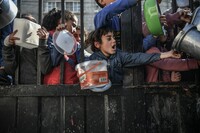Environmental impact of the war in Yugoslavia on South-East Europe
Environmental impact of the war in Yugoslavia on South-East Europe
Recommendation 1495 (2001) *
The Assembly notes with concern the serious environmental impact of military operations over the Federal Republic of Yugoslavia between 24 March and 5 June 1999, as documented inter alia by the United Nations:
i. air, river and underground transfer of pollutants have affected the whole of south-east Europe, particularly Albania, Bulgaria, Greece, Hungary, Romania, “the former Yugoslav Republic of Macedonia” and Ukraine;
ii. effects on health and quality of life will be long-lasting, and future generations will likewise be affected, notably as a result of the targeting of industrial and storage sites containing substances hazardous to health and Nato’s use of ordnance containing depleted uranium;
iii. direct and indirect damage has dramatically worsened the condition of the natural environment, which was already very poor.
2. States involved in these operations – and operations in Bosnia and Chechnya – disregarded the international legal rules (Articles 55 and 56 of Protocol I (1977) to the Geneva Conventions of 1949) intended to limit environmental damage in armed conflict. In the Assembly’s view these rules should be strengthened and enforced in order to prevent or at least lessen such violations of fundamental human rights in any future conflict.
3. Further to its Recommendation 1452 (2000) on the parliamentary contribution to the implementation of the Stability Pact for Southeastern Europe, the Assembly considers:
4. The Assembly accordingly recommends that the Committee of Ministers:i. that the means available to affected countries are inadequate to protect and rehabilitate the environment;
ii. that those countries should be provided with special technical and financial assistance for emergency environmental rehabilitation measures and for monitoring the health and living conditions of their populations;
iii. that rehabilitation of the environment should be included in programmes for economic, social and transport rebuilding; that these programmes should adopt an integrated approach to socio-economic and long-term ecological issues, in keeping with acknowledged principles of “sustainable development” as set forth in the Declaration of the United Nations Conference on Environment and Development (Rio de Janeiro, 14 June 1992); and that the Stability Pact for Southeastern Europe should be enhanced by a special protocol for repairing the environmental damage caused by the conflict;
iv. that non-governmental organisations are making important contributions, not least in terms of heightened public awareness; that the international community should give them greater support; and that the Stability Pact should also be used for this purpose.
i. initiate joint discussions with the OSCE on drawing up a convention, notably to ensure compliance with Articles 55 and 56 of Protocol I (1977) to the Geneva Conventions of 1949, on the prevention of environmental damage as a result of military force or crisis-defusing measures;
ii. consult with the European Union on drawing up a protocol to the Stability Pact for South-Eastern Europe to tackle the region’s environmental problems;
iii. use its own resources to support non-governmental organisations in the region, including the Federal Republic of Yugoslavia, which are engaged in repairing environmental damage caused by military operations and in rehabilitating the natural environment.
iv. call for a ban on the manufacturing, testing, use and sale of weapons containing depleted uranium or plutonium;
v. demand that NATO and the UN implement a medical surveillance programme for civilian populations in the Balkans, soldiers having taken part in operations, members of humanitarian organisations and journalists having worked in the area.
Articoli correlati
 Sullo sfondo emerge il grande business della guerra
Sullo sfondo emerge il grande business della guerraFame, bombe e sfollamenti forzati: queste le armi del governo israeliano contro Gaza, Libano e…
Netanyahu ha bombardato ospedali e scuole, fatto morire di fame bambini, distrutto infrastrutture e alloggi e reso la vita invivibile a Gaza22 ottobre 2024 - Rossana De Simone Da settembre di quest’anno
Da settembre di quest’annoDa Roma a Parigi, nasce in Europa la Rete ebraica per la Palestina
A Parigi, nel marzo 2024, 20 gruppi ebraici provenienti da 14 Paesi europei si sono incontrati per la prima volta durante un convegno internazionale in solidarietà alla Palestina. Da lì è iniziato un percorso comune, sotto l’ombrello di European Jewish for Palestine (Ejp).9 ottobre 2024 - Redazione Pressenza Italia Appello contro la “banalizzazione del nucleare”
Appello contro la “banalizzazione del nucleare”75esimo Summit della NATO a Washington: non solo il ritorno degli euromissili
L’esercizio di queste capacità avanzate deve servire a dimostrare l’impegno degli Stati Uniti nei confronti della NATO e il suo contributo alla deterrenza integrata europea25 luglio 2024 - Rossana De Simone Dobbiamo indagare alle radici del fenomeno o non lo risolveremo mai
Dobbiamo indagare alle radici del fenomeno o non lo risolveremo maiRazzismo istituzionalizzato e razzismo sistemico in Italia
Non permettiamo che le istituzioni siano così disumane! CPR, profilazione razziale, tempi biblici della burocrazia che costringono migliaia di persone a vivere senza cittadinanza italiana; il tokenismo, il minority stress. Il razzismo disumanizza anche chi si trova in posizione di privilegio.24 giugno 2024 - Maria Pastore
Sociale.network